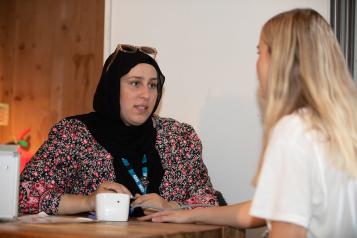Perspectives on primary care part 1: Mothers of young children
One of the main ways that people interact with the NHS is through primary care services, such as their GP.
Most people are satisfied with the care they get but they also think there are things that could make services even better.
Working with Healthwatch Southend, we spoke to mothers of young children in Southend-on-Sea to get the their perspective. Here is what they told us:
Booking a GP appointment can be ‘almost impossible’
When they were able to book appointments, it was rarely at a good time for them.
One woman said that she could never get through on the phone so would drive to her GP practice - and pay for parking - just to make an appointment:
“They say, ‘There might be some appointments available online,' and you think well I’ve got someone who's vomiting everywhere, someone who's screaming […], I can’t even […]create the processes inside my brain [to book an appointment]."
Walk-in centres offer more flexibility when trying to book
Several mums preferred to go to the local walk-in centre and wait to be seen, as this was less likely to interfere with their daily schedules, such as nap and feeding times.
Mothers told us they do not feel supported
They feared being considered a failure by their GP and that their children would be taken away. They felt that GPs weren’t looking for signs of post-natal depression and didn’t ask questions about their mental health.
Stigma around postnatal depression and not wanting to show signs of ‘weakness’ or being considered a ‘bad mum’ prevented them from telling their GP about how they’re feeling:
“… you’re worried that you’ll look like a bad mum. You already feel like a bad mum anyway, but if someone’s labelled you as not coping…”
Mothers told us that they didn’t feel listened to
They felt their concerns were not taken seriously and that the GP often dismissed their worries as paranoia. One mother said a problem with her baby’s hip was repeatedly misdiagnosed as ‘teething’:
“I avoid going to the GP at all costs, and I don’t want to clog up A&E, but recently, after going to the doctor three times, it was only on the third that the doctor looked at some [of my baby’s] previous symptoms and then sent us straight to A&E.”
Conflicting information from different health visitors left people feeling stressed and confused
They told us professionals can give advice based on experience, and that meant they received conflicting information.
With 8 in 10 people saying they are interested in sharing their views of services to help improve them, we are calling on primary care professionals to talk to their patients more.
Through listening to what people think today, services will be more able to identify the improvements that can help deliver an even better service tomorrow.
Find out more
Read more about what people told us about their experiences of primary care services.


